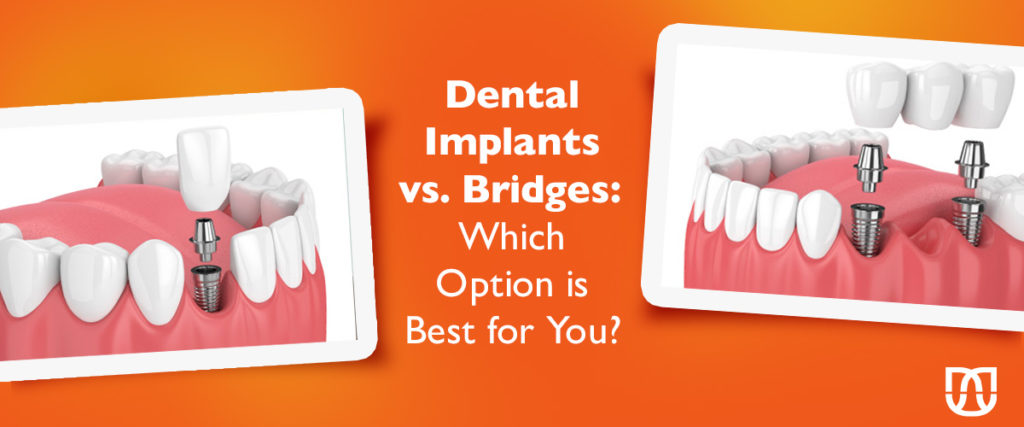
When it comes to restoring missing teeth, dental implants and bridges are two popular options that can greatly improve your oral health and restore your smile. However, choosing between the two can be a challenging decision. To help you make an informed choice, we have compiled this blog post to compare dental implants and bridges, outlining their benefits and considerations. By understanding the differences between these treatments, you’ll be better equipped to make the best decision for your unique dental needs.
Dental Implants: A Permanent Solution
Dental implants are considered the gold standard for replacing missing teeth. They are designed to mimic the structure and function of natural teeth, providing a long-lasting and aesthetically pleasing solution. The process involves surgically placing a titanium post into the jawbone, which serves as an artificial tooth root. Once the implant fuses with the bone, a dental crown is attached to complete the restoration. Here are some key advantages of dental implants:
- a) Stability and Durability: Implants offer exceptional stability and durability, allowing you to chew, speak, and smile confidently without worrying about slippage.
- b) Preservation of Bone Health: Implants stimulate the jawbone, preventing bone loss that often occurs with tooth loss. This helps maintain your facial structure and overall oral health.
- c) Natural Appearance: Implants are designed to closely resemble natural teeth, providing a seamless and natural-looking smile.
Bridges: A Traditional Restoration
Dental bridges have been used for many years to replace missing teeth. They consist of artificial teeth (pontics) anchored to adjacent teeth using dental crowns. Bridges can be an effective solution for restoring a single tooth or multiple adjacent teeth. Here are some key advantages of bridges:
- a) Cost-Effective: Bridges are generally more affordable than dental implants, making them a suitable option for individuals with budget constraints.
- b) Non-Invasive Procedure: Unlike dental implants, bridges do not require surgery for placement. The process involves preparing the adjacent teeth and attaching the bridge securely.
- c) Quick Results: Bridges can be completed in a shorter time frame compared to dental implants, often requiring only a couple of visits to the dentist.
Factors to Consider:
Choosing between dental implants and bridges depends on various factors, including:
- a) Jawbone Health: Dental implants require sufficient jawbone density to ensure successful integration. If you have experienced significant bone loss, bone grafting may be necessary to support the implant.
- b) Adjacent Tooth Health: Dental bridges rely on the support of adjacent teeth. If these teeth are weak or compromised, it may affect the success and longevity of the bridge.
- c) Aesthetics: Dental implants provide the most natural-looking results, while bridges rely on adjacent teeth for support, which can sometimes impact the overall appearance.
- d) Long-Term Outlook: Dental implants are designed to last a lifetime with proper care, while bridges may require replacement after 10-15 years.
Deciding between dental implants and bridges requires careful consideration of your oral health, budget, and personal preferences. Consulting with an experienced dentist is crucial to evaluate your specific situation and recommend the best treatment option. At Moraga Dentistry, our team of dental professionals is here to guide you through this decision-making process and provide exceptional dental care. Whether you choose dental implants or bridges, taking steps to restore your missing teeth will have a positive impact on your oral health, functionality, and confidence for years to come.

